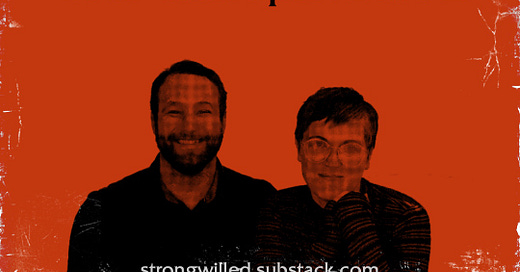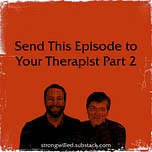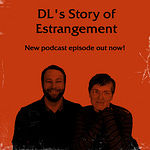Before jumping into the post, we wanted to note that we are so excited that STRONGWILLED was recently mentioned in Time Magazine in an important article: The Root of James Dobson’s Political Power Is Decades of Parenting Advice by Sarah McCammon. STRONGWILLED is a multimedia project aimed at helping survivors of religious authoritarian parenting methods recover autonomy and find solidarity, and as reader-supported project, we deeply appreciate those that have joined the community and are funding this work.
In today’s podcast episode, titled Send This Episode to Your Therapist, Part 2, we wanted to create a resource, a snapshot of how religious authoritarian parenting impacts family dynamics. There are a few ways to access this content: you can find and listen to the STRONGWILLED podcast here or wherever you normally listen to podcasts. You can also find the video of the podcast over on our Patreon—no subscription needed! Or, you can read this synopsis right here! If you are looking for the full transcript, please email us at strongwilledproject @ gmail . com.
This post is a condensed snapshot of the full podcast episode. It is designed to be easier to read and share with others.
Send this Episode to Your Therapist Part 2
For those who grew up under religious authoritarian parenting, there tend to be common themes of family dysfunction, including suppressing emotions, absence of healthy conflict resolution, thinking of children as good or bad, parental enmeshment, and emotional neglect. All of these dynamics are driven by a basic concept: God designed humans, relationships, the whole world, to work a particular way, and if you just follow God’s plan, you will see positive outcomes. If you feel sad, or find yourself in conflict, it’s because someone is failing to follow God’s plan—and we take time in this episode to explain how it drives these dysfunctional dynamics.
Evangelicals hold a belief system based on the idea that the Bible provides information and answers for all of life’s problems. So if there’s conflict in your family, you just need to follow the Bible’s rules regarding conflict. Likewise, if you’re experiencing uncomfortable emotions, God, through the Bible, will help. For example, if you’re feeling anxious, a Bible verse or prayer will help. If things aren’t going well, it’s because you either have yet to learn what the Bible has to say about it, or (more commonly) you’re disobeying the Bible (or Holy Spirit, or spiritual authority).
In this belief system, God designed the world, and gave humans instructions (rules) to be happy and healthy, so if something isn’t going well, it’s because someone isn’t following God’s rules or directions. In other words, if something is wrong, then someone has done something wrong. If you do things God’s way, things will go well (after all, he designed life in the first place). If you don’t do things God’s way, you’ll experience relational conflict, sadness, anxiety, anger and disappointment. If you’re feeling bad (or experiencing relationship problems) it’s because you’re sinning, stepping outside of God’s plan.
It’s a very fundamentalist approach to human existence, creating overly simplistic approaches to the complexity of emotions, relationships, problems, and other things that come with being human. And this idea of God’s design undergirds authoritarian parenting approaches, and impacts every aspect of family life.
Child’s Behavior, Golden Child and Scapegoat Roles
God’s design is for children to obey their parents. Saying “no” to a parent is not considered a normal developmental stage, it’s perceived as stepping outside of God’s plan for family. This discourages parents from asking if their children need extra support, or investigating if they perhaps lack the skills to follow family rules, and instead moralizes their behavior.
Many parents promote obedience because of their children’s safety: I want you to obey me when I say don’t run in the street, because I want you to be safe. Religious authoritarian parenting applies this rationale on a larger philosophical level, believing that people need to follow the rules of God’s design, if they’re going to remain safe from their own destructive choices.
Rather than viewing kids as having individual needs, kids were sorted into compliant or strong-willed, and these categories were spiritualized and moralized. There were kids who submitted to their parents, and therefore to God, and there were kids who were stubborn and rebellious, refusing to submit to their parents and therefore standing in opposition to God. The latter was identified as the “strong willed child,” which Dobson wrote an entire book about. Because his earlier methods of ensuring obedience from children didn’t work with every kid, he labeled some as “strong-willed,” and taught parents how to treat these children differently. It was very easy, in this framework, to view kids as either good or bad, compliant or strong-willed.
Many therapists will be familiar with the roles of the golden child and scapegoat in dysfunctional families, especially in families with a parent that has personality disorder traits. However, this sort of religious system encouraged parents to view and categorize their children as good and bad (without using those exact terms).
Since there isn’t room for a child’s individual needs and support, when a kid doesn’t follow the rules, it’s because they’re not following God’s plan. Again, if something is wrong, it’s because someone is doing something wrong. The kid who doesn’t just submit and acquiesce to parental authority is the problem, and they take on the role of the strong-willed child, or the scapegoat.
Family Conflict
In this system, it’s believed that God has a design to minimize conflict: hierarchy. Wife submits to husband, children obey their parents. If there’s a difference of opinion, the simple solution is to defer to the hierarchy. Often this means following the direction or opinion of whoever God has placed in authority over you, although it also means consulting the Bible, and the ultimate authority, which helps quickly resolve conflicts of opinion.
Rather than learning skills to talk through issues and resolve them together, listening to everyone’s experience, kids who grew up in this setting are accustomed to being told to simply go along with whatever the parents want. Some kids submitted quickly, while others engaged in power struggles, but the underlying philosophy was the same: if children simply obey their parents, then there won’t be conflict or strife in the family. There’s no possibility that perhaps there are divergent needs within the family, which require extra care and attention to find a solution that benefits everyone.
Adults who grew up in this environment often struggle with negotiating and resolving conflict with others, whether at work, in friendships or in intimate relationships. They likely will struggle to pay attention to their own experience, a key skill in advocating for themselves and coming to helpful solutions with others. They learned, in their family, it doesn’t matter what I think or feel, I just have to go along to get along. Sometimes it doesn’t even occur to them to share their perspective, concerns, or needs, assuming that they will be shamed or rejected for simply sharing them.
Spiritual Bypassing and Emotion Management
In this system, if you follow God’s plan, based on his design for humans, all your emotional needs will be met. Therefore, any emotional distress can be solved through simply following God’s rules for life. If you’re anxious, you should try harder to trust that God is in control. If you’re sad, you should remember how much God loves you. And this means that if you are feeling bad, you’re not trusting enough or believing enough, or praying enough.
In communities that subscribe to this system, many parents were emotionally engaged with their children in a way that seemed supportive, but was dismissive of emotions. They would ask about their child’s inner world. They might ask questions like, “how’s your heart?” which sounds intimate, but actually was a prompt for the child to self-analyze and criticize, searching their heart for sin.
Or parents might simply ask how their child is feeling, but when a child answers honestly, they would likely be met with spiritual guidance rather than validation and comfort. A child sharing that they feel sad might be met with Bible verses about why they should have the joy of the Lord, or even that they should turn to God with their emotions, rather than being offered comfort and validation from the parent themselves.
So children learn that if they feel bad, it’s because they’re doing something incorrectly, rather than learning that emotions of all kinds are simply part of life. They learn that if they feel bad, they’ll simply be met with advice on how to feel better, containing an implicit message: if you just behaved differently, you wouldn’t feel bad, therefore it’s your fault.
There are a few long-term impacts of this kind of parenting. People who grow up with this parenting will feel afraid of sharing their uncomfortable emotions with others as an adult, because they expect to be blamed for the way they feel. This also impacts how they relate to their own emotions, often blaming themselves for how they feel, rather than accepting that everyone feels bad sometimes. This dynamic also stunts the development of self-compassion. A child grows up with that core belief: if something is wrong, I must’ve done something wrong.
Parents Remain an Authority Even into Adulthood
In this system, parents are taught to expect to have a level of authority or influence on their child’s life, even into adulthood. In God’s design, parents provide wisdom and direction to their children, even when they grow up. With this dynamic, children are not taught to trust their own institution or develop decision-making abilities, but instead are expected to defer to their parents. So even when they arrive into adulthood, it can be difficult to know how to make decisions, because it’s not a muscle that has been exercised.
Then as children grow up, this system either creates tension in the relationship between parents and their adult children, or the children make their life decisions based on their parents’ values and desires. It can often result in parental enmeshment, where adult children are trained to be overly dependant on their parents, rather than developing independence and individuality. This includes a dynamic where adult children feel that they have to justify their life choices to their parents, whether explicitly, or in their internal world.
It’s incredibly important for therapists to understand that these power dynamics continue into adulthood. Some will be able to communicate with parents, but it’s just as likely that parents will find boundary-setting as an upset to the hierarchical family system where children remain under their parents’ authority, no matter their age.
Emotional Neglect
Of course, families that practice religious authoritarian parenting will see variations in these dynamics. However, when these dynamics are strongly present, the impact is emotional neglect. Rather than connecting with a child’s emotions or working through conflict together, when parents continually outsource engagement to the religious system, they don’t provide the relational connection that children need.
When parents are more engaged with their religion than their children, Marlene Winell writes, it’s a type of neglect that is less-recognizable. She writes, “What happens when children become secondary to a greater good is similar to the neglect that happens to children in families where one parent is addicted to drugs, alcohol, work, or money. Religious devotion, however, tends to involve both parents and can thus be especially problematic….With other kinds of neglect, society is more likely to respond with censure or punishment, require treatment or suggest alternatives, but this kind of intervention is very unlikely within a religious family system.”
She also compares children who grow up in rigidly religious homes to adult children of alcoholics, so we thought we’d include a list of those characteristics:
Lie when it would be just as easy to tell the truth
Judge themselves without mercy
Have difficulty having fun
Take themselves very seriously
Have difficulty with intimate relationships
Constantly seek approval and affirmation
Feel that they're different from other people
Are super responsible or super irresponsible
Are extremely loyal, even in the face of evidence that the loyalty is undeserved
Tend to lock themselves in a course of action without giving serious consideration to alternative behaviors or possible consequences.
Have an overwhelming sense of responsibility
Are concerned more with others than themselves
Feel guilty when they stand up for themselves
Stuff their feelings
Do anything to hold on to a relationship
Become reactors instead of actors
These are just some of the ways that religious authoritarian parenting impacts family dynamics. As a community, we’re continuing to discuss common experiences of those who grew up in this environment— how it shapes family life in childhood, its long-term impacts on individuals, and what happens to relationships between parents and children as children grow up.
Let us know in the comments:
Which of these themes resonates with your experience?
What are some dynamics you’ve noticed in your family?
What do you think therapists should know about family dynamics when kids grow up with religious authoritarian parenting?
Whether you are someone who was raised with RAP methods, a therapist who works with religious trauma clients, or somebody who is simply interested in these topics, we hope you found this resource to be helpful. STRONGWILLED is a reader-supported publication and we are so grateful for all of the support we have received — there are over 2,000 of you here! You can help this project continue on by liking, sharing, and subscribing to the Substack and by supporting us financially.
Who we are:
D.L. Mayfield (they/them), is an autistic non-binary writer and parent. D.L. grew up as a homeschooled evangelical pastor’s kid, and spent many years in the Christian writing world before deconverting from Christianity in 2022, and they enjoy deep diving history in order to find patterns.
Krispin Mayfield (he/him), is a licensed therapist and author who specializes in religious trauma and neurodivergence. Krispin was also raised evangelical and spent his teenage years as a missionary kid before also leaving Christianity in adulthood. Krispin and D.L. have been married for almost 17 years and are the parents of two incredible children.


















Share this post